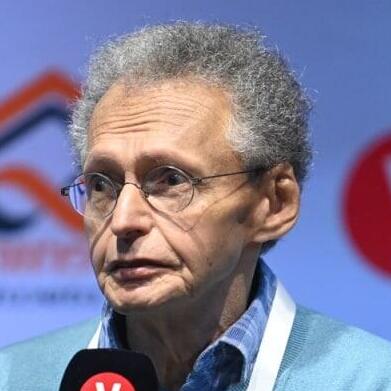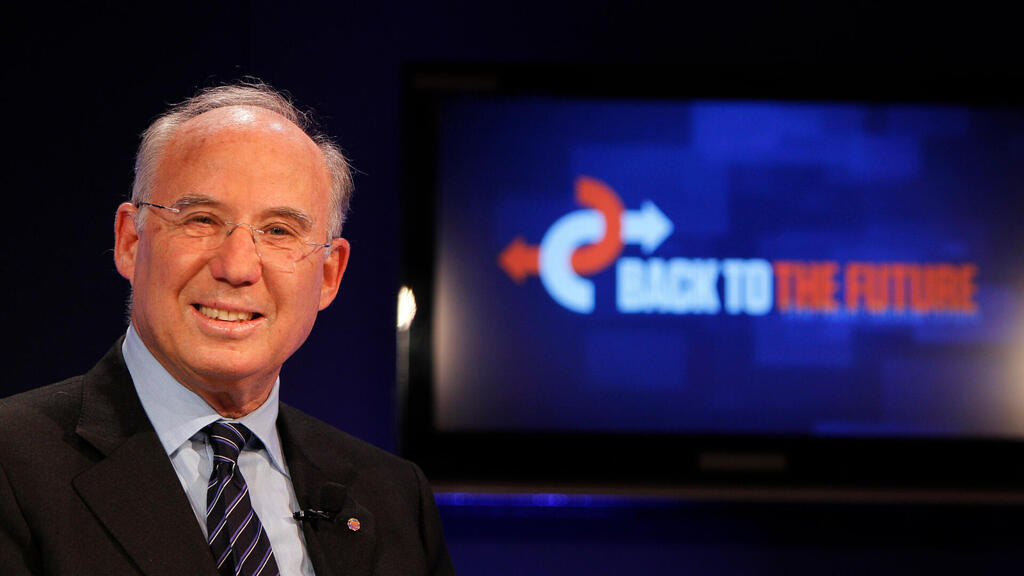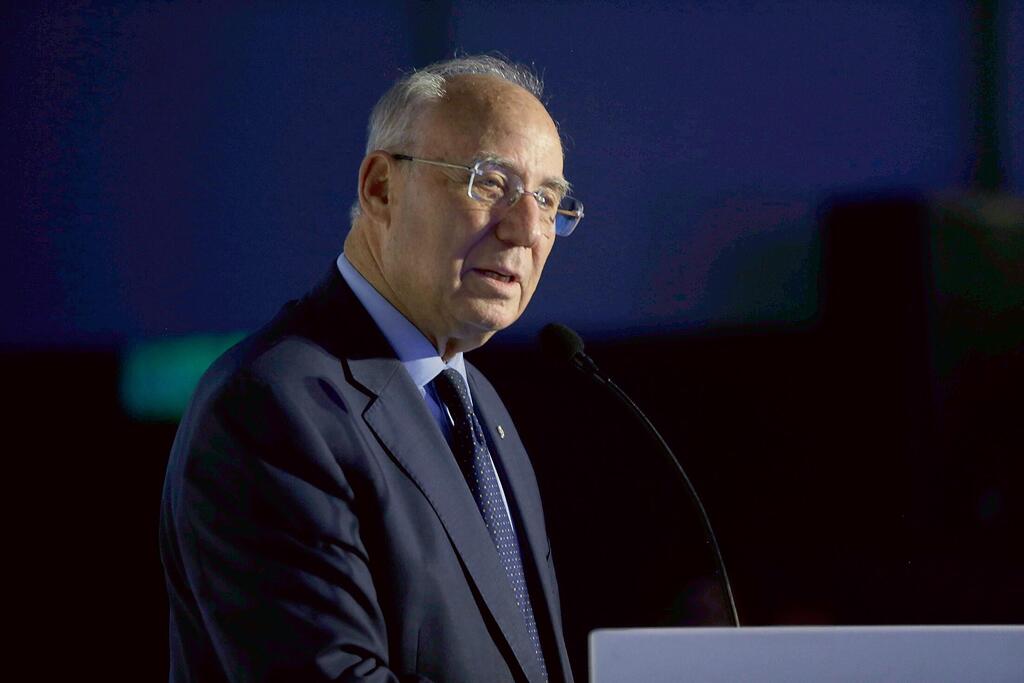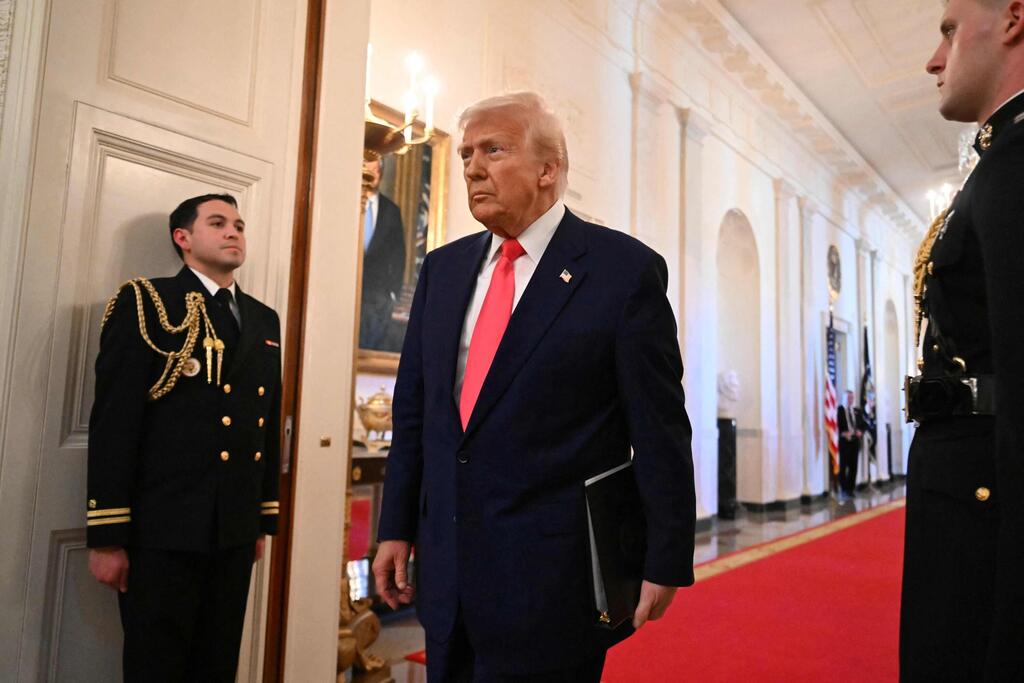Getting your Trinity Audio player ready...
“All my family is in Israel, but when I look at my grandchildren, I ask myself what must be done to ensure they choose to stay here,” says Prof. Jacob Frenkel, 82.
Frenkel needs no introduction to Israeli readers — he is arguably the country’s most renowned economist. Still, here’s a brief summary of his major career milestones: He served as a professor of economics at both the University of Chicago and Tel Aviv University. He headed the research department of the International Monetary Fund and was chief economist for the G7, the Group of Seven industrialized nations. In 1999, he accepted an invitation from Prime Minister Yitzhak Shamir to serve as governor of the Bank of Israel, relinquishing his U.S. citizenship permanently. He remained in the role for nearly seven years
Following that, Frenkel held senior roles at major U.S. financial institutions, including as chairman of AIG and of JPMorgan Chase International, one of the world’s largest banks. He earned high praise from the U.S. government for his role in responding to the 2007–2008 global financial crisis. When Prime Minister Benjamin Netanyahu later asked him to return to head the Bank of Israel, Frenkel politely declined, despite the close relationship between them.
For the past two years, Frenkel, an observant Jew, has consistently taken part in weekly protest rallies in Tel Aviv, where he has also delivered speeches. “I’m not protesting against Bibi,” he emphasizes, using Prime Minister Netanyahu's nickname. “I’m protesting for something: for a democratic, liberal, law-abiding State of Israel led by people of integrity. I hope to see all the hostages freed and for us to quickly return to the global standing we held until January 2023 — as leaders in creativity, open dialogue, mutual aid, technology and our remarkable ability to recover from global financial crises. Yes, we were, without exaggeration, a light unto the nations.”
Has that light gone out?
“You can see the destructive erosion in our status for yourself,” Frenkel says. “I live in fear that we are on the verge of losing our most important advantages. Right now, here and now, uncertainty about our future is taking root.”
What, as an observant Jew, do you feel makes this Passover night different from all others?
“Let me step outside economics for a moment. Between last Passover and this one, the Jewish state has fallen into a trap of overconfidence, of arrogance, of ignoring the warning: ‘Might does not last forever.’ We are blinded by dangerous hubris. We’ve lost our sensitivity to incitement, division, hate speech, the trampling of rights and disregard for others. When a society fails to deal with internal rot, it falls apart from within.”
Drunk on power
At exactly 7:20 a.m. Israel time last Wednesday, U.S. President Donald Trump's sweeping new import tariffs took effect, sending shockwaves through the global economy. Just twelve hours later, at 7:20 p.m., Trump posted a characteristically garbled message on X announcing a sudden 90-day suspension of the tariffs—excluding heavy levies on Chinese imports—and a uniform 10% rate on all other imports, including those from Israel. The global financial world was once again thrown into disarray, gripped by a sense of lost direction and leadership.
Are we aboard a global aircraft being piloted by a man drunk on power, manipulated by charlatans and imposters, sowing deliberate chaos?
“I’m inclined to answer yes. Trump’s tariff plan—initially launched with such determination and now partially frozen—stands out as one of the most disastrous economic policy blunders in decades. I can’t recall any global economic step so harmful, so unnecessary and so deeply ignorant of basic economic principles and historical lessons.”
The same mouth that declared one thing the day before can just as easily reverse itself tomorrow, depending on which side of the bed the speaker wakes up on.
“The U.S. president acted with extreme irresponsibility, and the dramatic market swings reflect deep fears over erratic, personal and baseless economic policy—chaos as a method, a strategy for making critical decisions by the man at the helm of the American superpower. The world won’t soon forget Trump’s dizzying flip-flop, and global uncertainty is bound to rise. After all, he hasn’t canceled the tariff plan—just paused it for 90 days.”
So what caused the sudden reversal?
“I see three major factors that influenced Trump. First, intense pressure from the billionaires who funded his campaign. Their demands to scrap the tariffs grew louder as markets plunged. Second, the looming midterm congressional elections in about 18 months. Had those elections taken place under the economic fallout of Trump’s original tariff plan, the U.S. would likely have been in deep recession and inflation, wiping out the Republican majority in both chambers. Trump clearly took that political forecast seriously. The third factor—the crashing stock market itself, which forced even Trump to exercise some economic discipline—at least partially.”
And what about the urgent warnings from professional economists?
“They don’t affect him. He doesn’t care. His closest advisers are dogmatic ideologues with fringe, often bizarre views. Their philosophy, now embraced by Trump, is: first destroy the old order—then see what happens. These are people of destruction, not reason.”
So what’s next?
“Trump brought the global economy to the brink, then took a step or two back at the last minute — and that, to his credit, must be acknowledged. But the threat of going over the edge remains. He’s now inviting America’s trade partners to the negotiating table while the tariff gun is still on the table — fully loaded. He’s effectively inviting them, especially China, to negotiate under blackmail and threats. That terrifies both individuals and markets. Uncertainty has become the defining feature of the Trump presidency, and the damage from his tariff whiplash is enormous and won’t disappear quickly. Major manufacturing firms are already announcing freezes on investment and cuts to employment.”
"The dramatic market swings reflect deep fears over erratic, personal and baseless economic policy. The world won’t soon forget Trump’s dizzying flip-flop, and global uncertainty is bound to rise.”
Could the consequences of his original tariff plan have triggered a global depression similar to that of the 1930s?
“In 1929, the U.S. stock market crashed following a frenzy of unrestrained speculation. Amid massive losses in investment and savings, two Republican lawmakers — Senator Reed Smoot and Representative Willis Hawley — reached the disastrously wrong conclusion that imposing high import tariffs would be the remedy to the Wall Street crisis. They succeeded in passing sweeping legislation that levied heavy duties on tens of thousands of imported goods. Then, as now, the move was justified as a way to boost domestic manufacturing jobs.
“More than 1,000 American economists — from both the left and right — published open letters warning of catastrophic consequences. They were right. The tariff law turned a financial crash into a deep economic depression: by 1933, U.S. GDP had been cut in half, and unemployment soared from 8% before the tariffs to 16% a year later, then to 25% within two years. Even without the Internet or television, America’s trading partners responded almost immediately with steep retaliatory tariffs, and the crisis spread globally like a contagion. The Great Depression of the 1930s wiped out the liberal-democratic middle class and paved the way for the rise of fascism and Nazism. That is the resounding lesson of history.”
The economic collapse served as a powerful cautionary tale for generations of policymakers considering the use of tariffs as a solution to financial crises.
“After World War II, U.S. trade policy underwent a complete transformation—from protecting domestic industries through tariffs and quotas to promoting multilateral free trade agreements. At Washington’s initiative, institutions based on reciprocity were established, including the International Monetary Fund, World Bank, World Trade Organization and the OECD. It was globalization before the word even existed. The system worked—lifting hundreds of millions out of poverty and reducing inequality between nations. It certainly needed improvement, especially in compensating those hurt by globalization in developed countries, but it was never something to dismantle. And yet here comes President Trump, reviving the dangerous economic mindset of the 1930s.”
Still, some point to the U.S. trade deficit as justification for Trump's tariffs.
“Already in the 19th century, the great British-Jewish economist David Ricardo proved the benefits of free trade, and his theory still holds true. Contrary to Trump’s portrayal, free trade has been particularly beneficial for America. But what worries me is not only the disregard for economic facts and expertise—it’s the language he uses to justify his plans. He divides the world into ‘us,’ meaning the U.S., and ‘them,’ meaning everyone else. He tells his audience, ‘they’ want to impoverish and weaken ‘us,’ the great American economy, so ‘we’ must strike back with full force. Tariffs are the weapon, and he wants to bring the world to its knees. He deliberately uses inflammatory, divisive language. There’s a reason he’s earned the titles ‘the Divider-in-Chief’ and ‘the Inciter.’”
"The Great Depression of the 1930s wiped out the liberal-democratic middle class and paved the way for the rise of fascism and Nazism. That is the resounding lesson of history.”
That divisiveness is not unique to the U.S. We see it in Israel too.
“Incitement and polarization are the cornerstones of a political strategy that prioritizes the interests of the ruling party’s base—its core supporters and voters—over those of the general public. To satisfy that base, authoritarian leaders and their successors are willing to take illogical, irrational and harmful steps that they believe—rightly or not—will be popular with their supporters. Unfortunately, this is happening in our own country as well. Just look at the state budget passed in the Knesset.”
A set of priorities
The economic cost of the war, not including the human toll, is already approaching 250 billion shekels ($67.5 billion)—a crushing burden, even for Israel’s resilient economy. Now, on top of that, comes Trump’s tariff threat on Israeli exports to the U.S., which will cause significant damage even if capped at 10%. Are the government’s budget and economic policies addressing these challenges effectively?
“The proper national economic response to both the cost of the war and Trump’s tariff measures must be sharp and unequivocal: accelerate economic growth. To achieve that, the government must urgently revise its budget priorities. It must immediately shut off the flow of coalition funds that reward political allies—money that enables and encourages parts of the Haredi community to avoid providing their children with a basic education and to stay out of the modern labor market. Instead of incentivizing growth, the budget is stifling it. Coalition survival is not a legitimate goal of national economic policy—it is a sign of its failure.”
Can Netanyahu’s government deliver real change?
“Israel’s current government suffers from a serious credibility deficit with its own citizens, as shown clearly in public opinion polls. That credibility gap stems from what any reasonable Israeli sees as a clear preference for non-productive sectors over productive ones, ignorance over education, avoidance over participation, narrow political interests over national priorities and short-term coalition survival over long-term national vision.
Get the Ynetnews app on your smartphone: Google Play: https://bit.ly/4eJ37pE | Apple App Store: https://bit.ly/3ZL7iNv
“This distorted set of priorities is always dangerous—but especially so now, in a time of great strife. A sharp shift must begin immediately through bold, forward-looking economic and budgetary measures. There must be no hesitation. The government must firmly take hold of the economic wheel and avoid racing into a dangerous intersection under a flashing red light. Only then can it begin to restore public trust and preserve the competitive advantages of Israel’s economy.”
"I have promoted Israel as a model democratic state. Today, I’m no longer certain that Israel’s democratic system can protect itself from those who are using the very tools of democracy to dismantle it. That frightens me more than Trump’s tariffs.”
To conclude, may we go back two years—why did you join the protests against the judicial overhaul?
“Because then, as now, I saw the overhaul as a key instrument in the destruction of Israeli democracy. The dismantling of an independent judiciary is the starting point for any regime that seeks to erode liberal democracy. Since my time as governor of the Bank of Israel—and even earlier, in international economic institutions—I have promoted Israel as a model democratic state. Today, I’m no longer certain that Israel’s democratic system can protect itself from those who are using the very tools of democracy to dismantle it. The judicial coup is continuing with full force—even during wartime. Shamelessly. That frightens me more than Trump’s tariffs.”
Those undermining a liberal Israel don’t care if we become a nation that dwells alone and is disregarded by the world. In fact, that’s what they want.
“Israel must not and cannot behave as if it’s an isolated island, a people that dwells alone. Our strength lies in being a bold, thriving model of liberal democracy. That is what made us flourish. The Abraham Accords—the main achievement of Netanyahu’s previous term—reflected our strong international standing. That standing is now at serious risk. This Passover, the festival of freedom, I place all my hopes—as an observant Jew—in Israel’s strong, enlightened, patriotic civil society, which is mobilized for justice. It is the new light unto the nations.”





